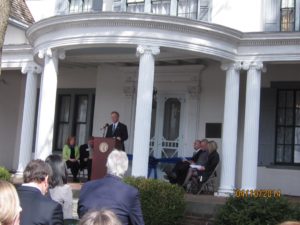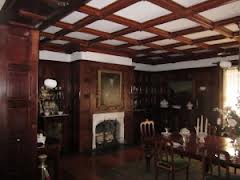We are finished with our work at Ringwood Manor. We were there nearly 8 months and were successful in removing the soot, repairing plaster and repainting about 30 rooms in this Historic mansion.
[ http://www.ringwoodmanor.com/history/hist.htm ]
The Manor is set to reopen sometime in mid April, so please make a point of visiting soon.
Spectra Painting, Inc is proud to have been selected to work on this incredible project. It was a very unfortunate accident that caused this work to be necessary. One of the Manors oil furnaces malfunctioned and blew soot into these Historic rooms. Coating everything, floors, walls, ceilings and all the irreplaceable furnishings. However, it was also a blessing in disguise, as this work may never have been done.
Thanks
Eric Doeler
President
Spectra Painting, Inc.
www.spectrapaintinginc.com
The 19th Century Manor and Industry
Martin J. Ryerson purchased the historic ironworks and began building the present Manor House in 1807 while still operating the iron mines and forges on the property. Ryerson ran 5 forge-furnace complexes in three counties from his headquarters at Ringwood for the next half century. Ryerson made shot for the war of 1812 and negotiated land and water rights with the Morris Canal Company for expansion of Long Pond (Greenwood Lake) and construction of the Pompton Feeder on the Morris Canal. The Ryerson Steel Company is still in operation today.
New York’s Peter Cooper, a remarkable inventor and industrialist and his young son-in-law, Abram S. Hewitt, purchased Ringwood in 1854. The properties were purchased for the rich local iron deposits but Mr. and Mrs. Hewitt set about making the old Ringwood estate their summer home. Hewitt enlarged the Manor in the 1860s and 70s. The completed house contains 51 rooms built in a wide range of styles, that characterize the Victorian Period. This impressive house is 226.5 feet long and features 24 fireplaces, 13 bathrooms, 28 bedrooms and more than 250 windows. The forges, mills, village and farms that serviced the iron industry gradually turned into the Victorian summer estate of the Hewitts, one of the wealthiest and most influential families of 19th-century America.
Ringwood is to industry what Williamsburg is to politics. Although eventually the industry moved west to the coal fields, bar iron was made at nearby Long Pond until 1882, and Ringwood’s iron mines finally closed in the 1950s. A major supplier of metal to the Union cause during the American Civil War, the Cooper-Hewitt Iron Company developed new methods and products throughout the industrial revolution to become an important factor in America’s growth, and the fifth-largest corporation in America. A collection of iron products and artifacts adorn the Manor grounds. The next generation of the Hewitt family divested themselves of involvement in both politics and the iron and steel industry, and having little use for the large estate, they gave Ringwood Manor to the State of New Jersey in 1936








